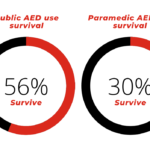At the age of 20, Sara experienced a sudden halt in her heartbeat. Now, scientists are determined to unravel the enigma behind such incidents occurring in young individuals.
Researchers are embarking on a quest to demystify sudden cardiac arrests in young people by creating a comprehensive genetic database encompassing individuals under the age of 50 who possess rare heart conditions, along with their respective family histories.
The Garvan Institute of Medical Research has unveiled a novel registry, dedicated to accumulating the medical records and blood samples of every individual in New South Wales (NSW) who has encountered a sudden cardiac arrest between the ages of one and 50.
It is a well-established fact that most sudden cardiac arrests in individuals under 35 are attributed to inherited genetic conditions, and regrettably, only one out of ten individuals manages to survive this dire situation.
Sudden cardiac arrests occur when the heart experiences a malfunction, resulting in an abrupt cessation of its beating rhythm. This critical event deprives the brain and vital organs of oxygen. It is imperative to distinguish these events from heart attacks, which stem from the blockage of coronary arteries, obstructing blood flow to the heart.
Associate Professor Jodie Ingles, the leader of this research endeavour and a specialist in cardiac genetics, emphasizes that the registry serves a dual purpose. It not only offers vital support and information to survivors and grieving families affected by sudden cardiac arrest but also strives to pinpoint the underlying genetic factors that may pave the way for innovative treatment strategies.
Ingles underscores the unfortunate reality that, for numerous patients, their initial awareness of an inherited heart condition occurs in the form of sudden cardiac death. She acknowledges that this is a harrowing way to discover one’s health condition and underscores the importance of avoiding such a scenario.
One of the pioneers to sign up for this registry in NSW is Sara Catena. In 2013, at the tender age of 20, she endured a cardiac arrest in her Newcastle residence. Initially diagnosed with long QT syndrome, a disorder impacting the heart’s electrical system, she had a small defibrillator implanted in her chest. Subsequent genetic testing revealed a different condition, arrhythmogenic right ventricular cardiomyopathy, a rare hereditary ailment that replaces normal heart muscle with fatty, fibrous tissue, disrupting the heart’s electrical signals.
Reflecting on her experience, Sara acknowledges the shock of surviving a cardiac arrest at such a young age. However, genetic testing helped her comprehend her condition and its potential onset from teenage years onward. Furthermore, it facilitated her family’s understanding of the hereditary nature of the disease.
Professor Chris Semsarian, a cardiologist affiliated with the University of Sydney’s Centenary Institute and Royal Prince Alfred Hospital, highlights the significance of a statewide database in ascertaining the causes of sudden cardiac arrest or death. This resource enables clinical cardiologists to provide more precise information regarding genetic risks to family members.
By establishing this registry, cardiologists hope to implement preventive measures against sudden cardiac arrest in affected families, ultimately enhancing accessibility to these critical services across the state.
The registry will consolidate and securely preserve cardiac data derived from survivor volunteers, their families, as well as data from NSW Ambulance and coroner’s reports. It mirrors a similar initiative in Victoria that has successfully gathered cardiac information from 3500 patients since 2019.
Annually, approximately 3000 Australians aged between one and 50 face the terrifying ordeal of sudden cardiac arrest, underscoring the urgency and importance of this research endeavour.





